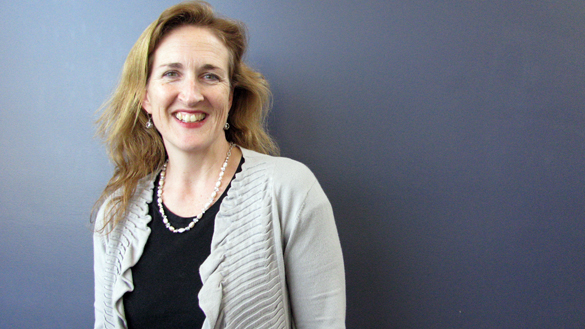Although one of Dr. Emily Magruder’s students described her teaching technique as animated and “dance-like,” the humanities lecturer–who holds a certificate in theatre and dance, as well as a bachelor’s degree in English, from Princeton–doesn’t let her classes waltz by with subpar work.
“The perception is that I have high expectations, but that I will help students meet them,” says Magruder, who is this year’s winner of the Lyle E. Gibson Dominguez Hills Distinguished Teacher Award.

Magruder, whose research interests includes women and inheritance, children’s literature, and law and literature, says that what she enjoys most about teaching humanities is that she is not confined to one area of expertise. Both during and after college, she sought to gain a diversity of experience, teaching English at grade schools in Kenya and at a refugee camp in Thailand. Upon returning home to the United States, she worked in public housing as a tenant organizer in New York City, instructing residents how to manage their apartment buildings so that they could eventually purchase them.
Magruder says that the lessons she learned in such divergent fields serve her well in her teaching at California State University, Dominguez Hills.
“If I were to create a narrative that pulls all of my work experience prior to graduate school together, the common theme would be teaching,” Magruder says. “I was prepared to be a teacher, but then I had all this other experience working with very different groups that had been brought together for different reasons. That helped me go into classrooms where you have adults returning to school who have a lot of work experience alongside young students who are eager but don’t have as much life experience.”
Margruder, whose mother was a middle and high school teacher, says that she was drawn to teaching as a career at an early age.
“Education is the one thing that makes social mobility possible,” says Magruder. “It’s good to be at a public university for that reason.”
The mother of two children, Magruder is grateful that teaching career allows her the flexibility to be actively involved in their education.
“It’s almost like getting to… go through school again myself and remember what it was that my teachers taught me at a basic level,” she says. “While there is a lot of specialized knowledge that we teach at the university level, sometimes it feels like we are building upon what [students] started learning in elementary school about communication: how to read, how to learn, and how to think.”
“My teaching philosophy is based in constructivism. I present fundamental tools and concepts, but I don’t give students my interpretations of the artwork or literature that we’re looking at. I will tell them what other people’s interpretations are, but most of the time, I give them the tools and ask them to build their own interpretations, and their own knowledge, for themselves.”
Magruder’s proactive approach is one of the qualities that students most appreciate about her.
“What students say a lot is, ‘I like the way you teach.’ When I ask them to be more specific, they’ll say it’s different. Part of what they mean is that I always tell them to draw their own conclusions.”
Magruder earned her doctorate and master’s degree in English at UCLA and was recognized with the Luckman Distinguished Teaching Assistant Award while a graduate student. Before arriving at CSU Dominguez Hills in 2004, she also taught at Loyola Marymount University, UCLA, CSU Los Angeles, and CSU Northridge.
Her service at CSU Dominguez Hills has extended to serving on the Humanities Program Committee from 2006 to 2009 and as the Humanities Program Liaison to California’s IMPAC (Intersegmental Major Preparation Articulated Curriculum) program, a collaboration between community colleges, the CSU, and the UC system. She is a member of the Modern Language Association (MLA), the Modernist Studies Association, and the Children’s Literature Association. She is currently writing a chapter on, “Nella Larsen’s Quicksand and Portraits of New Negro Women” for “Approaches to Teaching Nella Larsen’s Quicksand,” to be published by the MLA.
Magruder says that the diversity of CSU Dominguez Hills enhances her teaching and the experience of learning for students.
“We’re diverse [at Dominguez Hills] in many ways,” she says. “But diversity of life and work experience are, for me, what’s most important in the classroom. What’s exciting is when students really take the risk to learn [from that]. They get to see a lot of different ideas and ways of seeing the world from among themselves.”